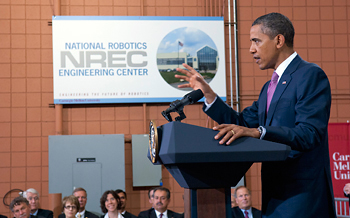Campus asked by President Obama to help boost investment in manufacturing
Chancellor Robert Birgeneau and five other university presidents met with President Barack Obama on Friday, June 24, in Pittsburgh to discuss a partnership among universities, government and industry to reinvigorate U.S. manufacturing.
June 28, 2011

Chancellor Birgeneau (lower left) listens as President Obama launches his advanced manufacturing partnership at Carnegie Mellon University. (Courtesy of CMU)
UC Berkeley will play a key role in a national effort recently created by President Obama to ensure that the United States remains what he calls “a nation that ‘invests it here and manufactures it here’ and creates high-quality, good paying jobs for American workers.”
Chancellor Robert Birgeneau was among six university leaders who met with Obama at Carnegie Mellon University on Friday, June 24, during the launch of the Advanced Manufacturing Partnership (AMP). These university presidents and chancellors will work with leaders of major U.S. manufacturers and federal government leaders to build a roadmap for advanced manufacturing technologies.
“The partnership will be critical in stimulating the efforts of government, industry and universities to define the path forward for U.S. leadership in advanced manufacturing,” Birgeneau said. “I am pleased that the University of California, Berkeley, was called upon to play a leadership role in applying its expertise and direction to this critical initiative.”
“At UC Berkeley, we agree with the premise of President Obama that economic development and the creation of societal benefit to the U.S. has to take the additional step of incentivizing the creation of design, rapid prototyping and manufacturing technologies to the existent innovation pipeline,” said engineering Dean Shankar Sastry. “With traditional strengths in semiconductor manufacturing; precision machining and manufacture; technologies for green industry, such as biofuel production, photovoltaics and building energy efficiency technologies; and a vision for educating a new generation of engineering leaders, UC Berkeley is very pleased to have been chosen to be one of the six lead universities in AMP.”
The AMP will be led by Andrew Liveris, chairman, president and CEO of Dow Chemical, and Susan Hockfield, president of the Massachusetts Institute of Technology.
“We are still the largest manufacturing country in the world by volume, but a lot of manufacturing is going overseas, in part because we aren’t creating and replenishing the skilled workforce that can actually run the facilities and machinery that make today’s advanced products,” said David Dornfeld, chair of mechanical of engineering, who is working with Birgeneau on the AMP.
“You have to have the driver of academic research and development for innovative products and you have to have the educational infrastructure to be able to train people to produce them,” he said. “That is what the big challenge is going to be.”
The president’s plan will leverage existing programs and proposals but also invest more than $500 million in key areas to jumpstart the effort. These areas include: building domestic manufacturing capabilities in critical national security industries; reducing the time needed to make advanced materials used in manufacturing products; establishing U.S. leadership in next-generation robotics; increasing the energy efficiency of manufacturing processes; and developing new technologies that will dramatically reduce the time required to design, build, and test manufactured goods.
Leading universities and companies will complement these federal efforts helping to invent, deploy and scale these cutting-edge technologies.
“Today, I’m calling for all of us to come together- private sector industry, universities, and the government- to spark a renaissance in American manufacturing and help our manufacturers develop the cutting-edge tools they need to compete with anyone in the world,” Obama said.
The AMP is being developed based on the recommendation of the President’s Council of Advisors on Science and Technology (PCAST), which released a report June 24 entitled “Ensuring Leadership in Advanced Manufacturing.” The PCAST report calls for a partnership between government, industry and academia to identify the most pressing challenges and transformative opportunities to improve the technologies, processes and products across multiple manufacturing industries.
UC Berkeley has always had a very strong tradition in manufacturing, Dornfeld said, most prominently in the semiconductor industry involving methods for making integrated circuits. But it has also had an impact on traditional industries, such as automotive manufacturing, precision manufacturing and microelectromechanical systems (MEMS), and design and control of advanced vehicles. Among current projects are new initiatives in robotics, sustainable product design and manufacturing, energy and biotech production and health care.
The College of Engineering also will launch this fall a new, one-year Professional Master’s program that will include elements of entrepreneurship and manufacturability and innovation. The degree program has been created through the new Coleman Fung Institute for Engineering Leadership “to address the concerns that we are not providing a workforce which is able to treat the needs of industry in manufacturing,” according to Sastry.
UC Berkeley, MIT, Carnegie Mellon University, Georgia Institute of Technology, Stanford University and the University of Michigan have made a commitment to form a multi-university collaborative framework for sharing of educational materials and best practices relating to advanced manufacturing and its linkage to innovation.
“I think we are going to see a rebirth of interest in manufacturing, and in fact, we’re seeing that now in our mechanical engineering students,” Dornfeld said.
He referred to a recent study that identified 1.5-2 million jobs now unfilled in this country because the workforce lacks the skills needed to operate advanced manufacturing equipment.
“That is the market we are trying to address. Get those people educated and get them into those jobs ‑ and that may involve the whole California educational structure ‑ and keep creating the processes and products that drive manufacturing and industry forward.”
For more details on the AMP, link to the White House press release.
For more information:
- Carnegie Mellon University story about President’s visit
- PCAST Press Release (pdf) and report (pdf)